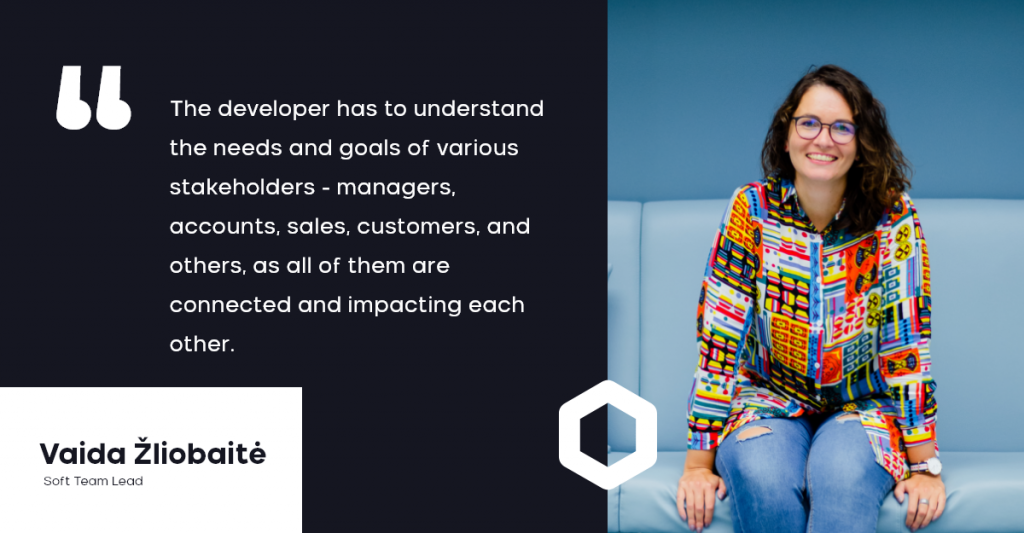Sometimes it looks like writing good code is the developer’s only job. Working in the IT field, we often emphasize technical skills and coding proficiency. And don’t get me wrong – it matters a lot. However, in many work-related situations, soft skills make all the difference. Tech people participate in meetings with clients and collaborate with peers. Project managers value the ability to present your work. Client satisfaction is not only based on your ability to complete tasks but on your interpersonal skills as well. The phrase “It was a pleasure to work with you“ is probably one of the most rewarding things a client or a colleague could say to a team member working on a project. Even in job interviews, the first impression is often made by your ability to communicate as it shows if you can “sell” yourself, your ideas, or deal with stressful situations.
While working with developers daily, I noticed that some soft skills are the game changers in daily activities and the ones who master them are valued a lot by the clients and management team. If you have a goal to grow as a professional, besides improving your technical knowledge, you have to also step up your soft skills game. So what soft skills are most crucial for software developers to master?
Talking in non-technical terms
From a client’s perspective, a developer needs to be able to talk in non-technical terms. Only in rare cases, a client has something to do with programming. More often it‘s a non-technical person who is not necessarily able to understand all the programming stuff. So if a developer can explain a complex technical problem or simply pitch an idea with understandable examples, it‘s much easier for a non-technical person to understand and be able to follow what we‘re talking about.
Balancing the needs of multiple stakeholders
The developer has to understand the needs and goals of various stakeholders – managers, accounts, sales, customers, and others, as all of them are connected and impacting each other. And good communication skills here are crucial. If a developer can effectively support the sales process, he might have an interesting project to work on.

Ability to explain your work
Your work, ideas, and solutions might be challenged and questioned. A developer should be able to explain why the chosen solution is the best for the product. If there is more than one way, how and why did you decide that this is the right solution to the problem? For a developer, it might be just obvious. But if he/she was able to explain it to the client (in non-technical terms!), project manager, or a colleague – it shows professionalism and expertise.
Pro-activeness
One of the big advantages of a developer is his proactiveness in a project, initiatives, or knowledge-sharing activities of the company. Do you see any additional value which you could add? Do you have any idea how to make it more user friendly? When a developer not only does what is agreed but also is pro-actively participating and usefully advising, it shows his interest and willingness to make a product as good as possible. Also, it helps the whole team or even the company to grow.
Positive attitude
Positive attitude and friendly approach help to improve your interpersonal relations, which overall translates to better performance. Have a chit-chat with a client before the meeting starts. Show that you care (and do care!). Think about a project as your own. Be helpful if you see that your mate is stuck with a task. Think about why you choose to go asking for help from a particular person. Probably he’s easy to approach and has the knowledge you need. So be that kind of person to others.
Soft skills are here to complement hard skills
If you are focusing on your technical expertise only, it’s equally important to recognize and master certain soft skills. Don‘t know where to start? Try to explain what you do to your friend (if he‘s not a programmer). Try to think about one additional step that you could do in your current project. Make a presentation about the thing you’re good at for your team. Chat by the coffee machine with someone from the office you don’t work with directly. Try to lead a meeting. Ask for feedback about your communication from people you’re working with. It might be uncomfortable at first. But practice makes perfect, as they say. And if you want to be a professional developer, these soft skills might help you to raise your seniority, gain the trust for leading the team and be hardly replaceable in any company.

Vaida Žliobaitė
This article was written by TeleSoftas Soft Team Lead Vaida Žliobaitė. For more insights from Vaida follow her on Linkedin.
